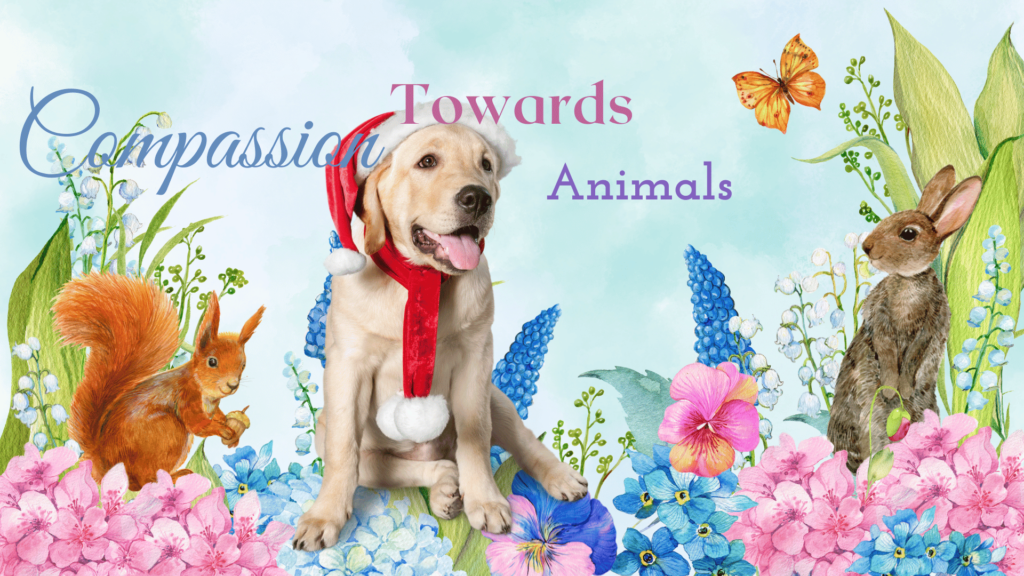Compassion for animals is intimately associated with goodness of character, and it may be confidently asserted that he who is cruel to animals cannot be a good man.
In a world where compassion is often overlooked, it’s more important than ever to remember the power of empathies towards animals. This is not just about being kind to furry friends; it’s about understanding the crucial role compassion plays in creating a more humane society. When we extend our hearts and minds to animals, we start to realize the interconnectedness of all living beings. This understanding allows us to cultivate a sense of responsibility towards the welfare of animals and, consequently, towards our own humanity.
Unleashing empathies towards animals is not just a moral imperative; it’s an essential step towards a more harmonious society. Research has shown that practicing empathy towards animals can translate into more compassionate behavior towards fellow humans as well. By nurturing empathy, we create a ripple effect of kindness and respect that extends beyond the animal kingdom.
Join us as we delve into the importance of compassion towards animals and explore how it can unlock the potential for a more compassionate and humane world. Together, we can build a society where empathy thrives and the well-being of all creatures is valued.
Index of Contents
ToggleThe benefits of compassion for animals
Empathies towards animals is essential for several reasons. Firstly, it allows us to recognize their inherent worth and value as sentient beings. Animals experience pain, joy, and a range of emotions, just like humans do. By empathizing with them, we acknowledge their right to live free from unnecessary suffering and exploitation.
Secondly, empathy towards animals helps us develop a sense of interconnectedness. We are all part of the web of life, and our actions towards animals have far-reaching consequences. When we treat animals with kindness and compassion, we contribute to a more balanced and sustainable ecosystem.
Finally, empathies towards animals fosters a sense of responsibility. It compels us to take action to protect their welfare and advocate for their rights. By extending our empathy to animals, we become stewards of the natural world and play an active role in creating a more compassionate society.
Empathy and its impact on creating a humane society
Compassion towards animals goes beyond their welfare; it also brings immense benefits to humans. When we practice empathy towards animals, we develop qualities such as kindness, patience, and understanding. These qualities are not limited to our interactions with animals but also extend to our relationships with fellow humans.
Furthermore, compassion towards animals can improve our mental and emotional well-being. Numerous studies have shown that spending time with animals and engaging in acts of kindness towards them can reduce stress, anxiety, and feelings of loneliness. Animals have a unique ability to provide comfort and companionship, allowing us to experience moments of pure joy and unconditional love.
The connection between empathy for animals and empathy for humans
Empathy is the cornerstone of a humane society. It acts as a catalyst for positive change and helps break down barriers that divide us. When we empathize with animals, we recognize their vulnerability and the need to protect them from harm. This recognition extends to our fellow humans, fostering a sense of equality and justice.
A society built on empathy is one that values the well-being of all creatures, regardless of their species. It promotes compassion, empathy, and respect as fundamental values. By cultivating empathy towards animals, we lay the foundation for a society where every living being is treated with dignity and compassion.
How empathy for animals can lead to positive societal change
Empathy is a universal trait that transcends species. When we practice empathy towards animals, we develop the capacity to understand and relate to the experiences of others. This extends beyond the animal kingdom and into our interactions with fellow humans.
Research has consistently shown a positive correlation between empathy for animals and empathies for humans. People who exhibit empathy towards animals are more likely to display compassionate behavior towards their fellow humans as well. This connection underscores the importance of nurturing empathy towards animals as a means to foster a more compassionate and understanding society.
Ways to cultivate empathy for animals in everyday life
Empathies for animals has the power to create positive societal change in various ways. Firstly, it raises awareness about animal welfare issues and encourages individuals to take action. This could involve supporting animal rights initiatives, adopting a cruelty-free lifestyle, or advocating for stronger animal protection laws.
Furthermore, empathy towards animals can drive innovation and the development of more ethical practices. For example, the growing demand for plant-based alternatives has led to the creation of sustainable and cruelty-free food options. This shift in consumer behavior reflects a deeper empathy towards animals and a desire to reduce harm.
Lastly, empathy for animals can inspire a shift in cultural attitudes and societal norms. As more people embrace compassion towards animals, it becomes increasingly difficult to justify practices that cause unnecessary harm. This shift in consciousness paves the way for a more compassionate and humane society.
The role of education in promoting empathy for animals
Cultivating empathies for animals is a lifelong journey that begins with small actions in our everyday lives. Here are some ways to foster empathy towards animals:
1. Educate yourself: Learn about the experiences and needs of different animal species. Understanding their perspectives helps us empathize with their struggles.
2. Connect with animals: Spend time with animals, whether it’s through volunteering at a local shelter, interacting with wildlife in nature, or simply caring for a companion animal. Building relationships with animals deepens our empathy towards them.
3. Practice kindness: Extend acts of kindness towards animals, such as feeding stray animals, providing shelter for wildlife, or supporting animal welfare organizations. These actions reinforce our empathy and contribute to a more compassionate society.
4. Spread awareness: Use your voice to raise awareness about animal welfare issues. Share information, stories, and resources that promote empathy and understanding towards animals.
Organizations and initiatives promoting compassion towards animals
Education plays a vital role in promoting empathies for animals. By incorporating animal welfare into school curricula, we can instill empathy and compassion in future generations. Teaching children about animal rights, biodiversity, and our interconnectedness with the natural world helps shape their attitudes and behaviors towards animals.
Furthermore, education can debunk myths and misconceptions surrounding animals, challenging harmful stereotypes and promoting a more accurate understanding of their needs and behaviors. By equipping individuals with knowledge, we empower them to make informed choices that align with their values of empathy and compassion.
Inspiring stories of compassion and empathy towards animals
Numerous organizations and initiatives are dedicated to promoting compassion towards animals. These organizations work tirelessly to protect animal rights, rescue and rehabilitate animals, and raise awareness about animal welfare issues. Some notable examples include:
1. The Humane Society of the United States: This organization works to advance animal welfare through advocacy, education, and rescue efforts. They tackle a wide range of issues, including animal cruelty, wildlife protection, and farm animal welfare.
2. World Animal Protection: World Animal Protection focuses on preventing animal cruelty and promoting animal welfare worldwide. Their work spans various areas, such as wildlife conservation, farm animal welfare, and ending the use of animals in entertainment.
3. The Jane Goodall Institute: Founded by renowned primatologist Dr. Jane Goodall, this organization is dedicated to wildlife conservation and promoting understanding and empathy towards animals. They focus on protecting chimpanzees and their habitats, as well as empowering local communities to become stewards of their natural environments.
Conclusion: Embracing empathy for a more humane society
There are countless inspiring stories of compassion and empathy towards animals that remind us of the incredible capacity for kindness within humanity. These stories highlight the transformative power of empathy and serve as beacons of hope in a world that often feels disconnected from nature.
One such story is that of Christian the lion. In the 1960s, two friends purchased a lion cub and raised him in their London apartment. As Christian grew, it became evident that he needed a more suitable home. They arranged for him to be reintroduced into the wild in Kenya. A year later, they returned to visit Christian, not knowing if he would remember them. To their astonishment, Christian recognized them and ran towards them, embracing them in a heartwarming reunion. This story showcases the deep bond that can form between humans and animals, even in the face of adversity.



